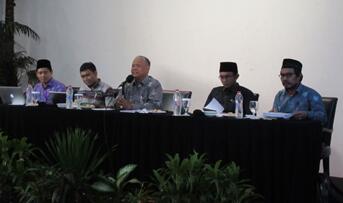JAKARTA, Indonesia, 27 March 2017: The active role of various elements of the society, including Islamic leaders has contributed meaningfully to Indonesia’s success in promoting family planning (FP) in the past, resulting in improved maternal and child health, better wellbeing and welfare of families and nation. Rebuilding ties with Islamic leaders is needed to revitalize FP.
UNFPA and the National Population and Family Planning Board (BKKN) provided support to Rumah KitaB, a foundation for Islamic research, to conduct a study on FP in Islam. The findings will be used for the development of FP advocacy, based on Islamic values, with active involvement of Islamic leaders throughout Indonesia. The study revealed opinions of prominent religious leaders in Indonesia, backed by Islamic teachings, stressing, among others, that:
- FP programme is very relevant today and need to be continued;
- FP is not a product of Western countries;
- FP does not alter/tamper with Allah’s creation; and
- FP is part of women’s right to have control over their bodies by allowing them to decide when to get pregnant and how many children to have.
“Hopefully, this study would assist in identifying strategies and evidence-based arguments to advocate about the importance of family planning, for the health of women and children and for a good quality of life for the family,” said UNFPA Representative Dr. Annette Sachs Robertson.
Head of BKKBN, Dr. Surya Chandra Surapaty, said that the country should not forget its past success as it proved that FP is essential for family resilience and contributes to building healthy and competent younger generation, which is necessary for national development.
For its past success in FP, Indonesia was awarded with the UN population award in 1989. However, recently, FP-related achievements, such as total fertility rate, unmet need and contraceptive prevalence rate have stagnated.
Population observers and activists have joined voices with BKKBN, calling on national and subnational government, civil society organizations, including Islamic leaders to renew commitment to FP and mobilize their active role for enhanced community engagement in FP.


